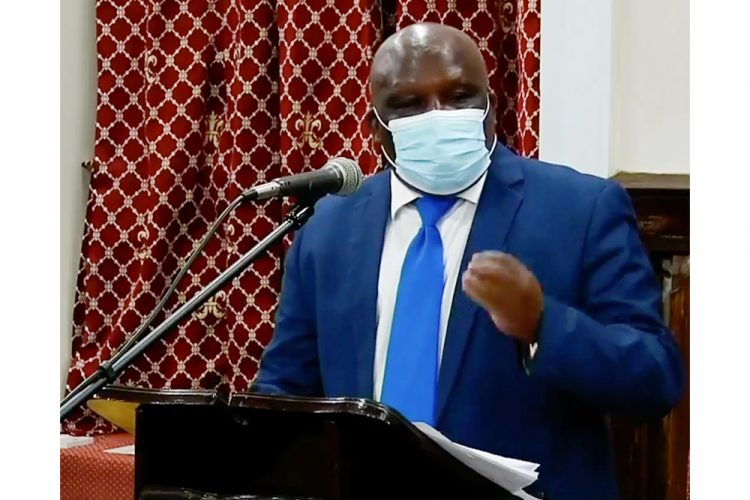Public Health Amendment Bill passes despite protests

Amendments to the Public Health Act, which would see certain front-line workers being required to be vaccinated, were successfully passed in Parliament last Thursday, despite widespread disagreement and protests from the public.
Health minister, St Clair Prince tabled the bill for debate in the House on Thursday night, some hours after Prime Minister Dr Ralph Gonsalves sustained injury to his head as he attempted to make his way on foot to the House of Assembly, through a mob of angry protesters.
Prince said the amendments to the Act were “yet another aspect of our response to this emergency that has crippled this entire globe and which threatens to derail completely, our social and economic situation here in St Vincent and the Grenadines”.
“It is nothing more, it is nothing less. This amendment requires certain front-line workers to be vaccinated in the public interest. Of course, we have been hearing all throughout the country about rights and whose rights we want to take away but we are not hearing the other part; whose rights are being infringed as a result of the monopoly which some people think they have on rights,” Prince said.
The health minister said the bill, which was passed in the wee hours of Friday morning without opposition support, will go a long way in tidying up the Public Health Act.
“It will give us the leverage we need to better respond to the COVID19 scourge and put us on a better path to normalcy. Now that we have experienced a pandemic, we must consider whether it is reasonable for a citizen infected with a communicable disease to be exempted from treatment for that communicable disease on the ground of personal belief when the entire community could be threatened by the communicable disease,” he said.
Prince further said “this is the area we are trying to zero in on, which is why of course, we are talking about frontline people”.
He pointed out that it was not an attack on the fundamental rights and freedoms of Vincentians “as some opportunistic commentators will have us believe, and it certainly does not violate freedom of conscience”.
In outlining one of the major amendments, Prince noted that the old section of the law allowed for a person to be exempted from an order for medical examination by a medical practitioner and an order requiring that person who has a communicable disease to place himself under the care and treatment of a medical practitioner, who is acceptable to a health officer.
It also allowed exemptions if the person who made the statement in writing, that the person believes the medical treatment for prevention or cure of the disease was prejudicial to the person’s health or that the person’s beliefs were opposed to it and furnishes a statement to the health officer.
Under the new section, exemptions are provided from an order requiring a person who has a communicable disease to place himself under the care and treatment of a medical practitioner, only where a medical practitioner acceptable to the Medical Officer of Health certifies in writing that the medical treatment for the disease is not advisable on the medical grounds or grounds stipulated in the certificate.
It also now gives the Chief Medical Officer power to require the person claiming an exemption,to submit an examination by one or more medical practitioners to determine whether the person should be granted the exemption on the medical grounds or grounds stipulated.
“This, of course, is to prevent certificate peddling and we know the social realities of St Vincent and the Grenadines; that somebody who doesn’t want to take a vaccine or to be tested goes to a medical practitioner somewhere and says, ‘Listen, I need a certificate to say that I have a problem and I ought not to take that particular vaccine’. It would not be so easy because it would be a panel of doctors who would look over that, after the Medical Officer of Health has seen it,” Prince said in Parliament on Thursday night.
He said it is the government’s job to protect the well-being of the country.
“We have to keep people safe and we have to ensure that their workplaces are safe for those people who want to work in those areas.
Vaccination is still the best tool in our fight against this pandemic and I am encouraging and taking the opportunity at this point to encourage all of us, especially the frontline workers, to take the vaccine to protect yourself and your fellowmen and women,” the health minister said.









